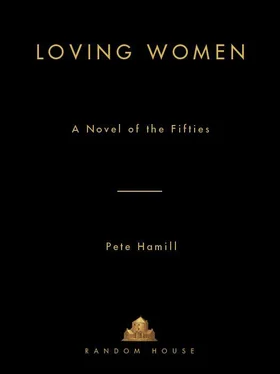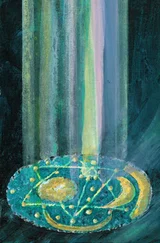We cleaned the snow away and then the wind rose and blew more snow across the strips and covered them again and Max laughed and said, “Well, that’s the Navy.” I saw a Spanish-looking guy in a flight suit, his features clean, with a neat moustache and high cheekbones standing on the runway taking pictures, and he motioned to us to join him. His name was Tony Mercado, a pilot with the Mexican Air Force, taking copter training in the States. He handed me the camera and asked me to photograph him in the falling snow.
It was a Leica, the first real camera I’d ever held. Heavy, solid, somehow mysteriously beautiful and scary. In all the years since, whenever I pick up a new camera in a store, or heft one of my own for the first time after waking in the morning, I remember that snowy day beside the hangars of Ellyson Field. I’d never felt anything like it before: a piece of machinery that made pictures.
Mercado told me what to do and I looked through the viewfinder and saw him posing before the half-open hangar doors, his smile bright, looking dashing, the snow blowing around him. He had me cock the camera again and then posed squatting, coffee cup casually in his hand, and I realized that he looked more like Clark Gable than any of the pilots who had been to the war. He thanked me in an accented voice and strolled away and I wanted to get the camera back from him and take pictures of the windsock flying straight out in the wind and the snow gathering at the base of the palm trees and Red Cannon hurrying over from the administration building with his plastic face all flushed and Sal loping away to the head. But I said nothing. Max leaned on his shovel and said, “You’re a photographer now.” And of course he was right, but I didn’t know it for a long long time.
The next day the snow was gone. The sun burned its way back, high and dim in the clear cold sky, but it wasn’t strong enough to rid us of the bitter cold. Liberty was restored. I wanted to go to town and search for the curly-haired woman, but after the night at the Dirt Bar I had no money, and it was three more days until payday. Still, Dixie Shafer had erased my shameful secret and I felt triumphant and powerful except for the money. Harrelson and Boswell left for Montgomery and the big service for Hank Williams. When they came back two days later, full of details and white lightning, we were all tired of Hank Williams and nobody wanted to hear about it. I walked through the Panhandle afternoons, listening for Bobby Bolden. But all the windows were still closed against the cold. I thought about going up to see him, but I was afraid he’d play some game in front of the other blacks and tell me to get lost. I wouldn’t let him do that.
We worked long days, with the helicopters flying from 0500 until sunset, thirty of them in the air at once, catching up on lost time. Somewhere in those few days I started to know the difference between push-pull rods and irreversibles, swash plates and wobble plates, cuff and trunion assemblies. I wasn’t sure what a gimbal ring was, but when Sal came to get one, he said that for shit sure it wasn’t available at Macy’s.
All Navy nights resembled one another. Broke, confined, we sat around on the bunks and read the newspapers or listened to the radio. We exchanged what was called “the gouge,” another word for lore, or “scuttlebutt,” which was rumor and gossip. I learned how to spit-shine my shoes. My hair grew longer. I pulled another midnight-to-four, learning the password first, and signed the clipboard once more for Red Cannon. I learned that the best place for tailor-made uniforms was Anchor Tailors on South Baylen Street. The manager’s name was Marie. But I didn’t want tailor-mades. I wanted civvies. I wanted to be able to go into town in normal clothes, with some money in my pocket, and find that woman with the curly hair.
But I needed money for clothes and a locker. As an airman apprentice in pay scale E-2, just above the bottom, I would get a check for $80.90 after the taxes were taken out. A fortune. Finally we lined up one morning at 1020 in Hangar Two to get our paychecks. Everybody else got paid, but there was nothing for me. Maher was the duty yeoman and he said he was sorry, that this sometimes happened to new sailors while the paperwork was being sent back and forth to BuPers in Washington. He’d look into it and let me know. Sal, Max and Miles Rayfield offered to loan me some money; I said I’d wait.
I stayed on the base for more than two weeks, waiting for the paycheck. Sal and Max went out most nights. Miles remained on board, but went off most evenings to some destination on the base itself, saying nothing. The image of the woman began to fade. I was sure she was with a guy now, perhaps a husband, some Navy lover. The weather stayed cold, but there was no more snow. I read the art book, my head filling with Rembrandt and Goya, Leonardo and Botticelli. At the Supply Shack, I got better at my work each day, and the mechanics now knew my name. I heard other hillbilly singers on the radio, Webb Pierce and Lefty Frizzell, and began to know the words. If Bobby Bolden was playing his horn, nobody on the base could hear him except the mess cooks. One chilly night I was in the barracks reading the Pensacola Journal . Miles and Jones were there. A story on page one said that 40,000 American servicemen had deserted since the beginning of the Korean War and 36,000 had been recaptured. That was astonishing. “Who the hell blames them?” Miles said acidly. “What’s that goddamned war about anyway?” Jones bristled, said it wasn’t a war, it was a police action, and Miles said you couldn’t tell that to the dead, and Jones said that if we didn’t fight the Communists in Korea we’d have to fight them in San Diego, and at that, Miles laughed and shook his head. “Jonesie,” he said, “that’s the hoariest cliché of the decade so far.” Jones bristled again, said there’d always be cowards in any war, men who’d rather run away. Miles said: “We’re talking about two complete divisions of deserters, Jonesie. Doesn’t that tell you something? “Yeah,” Jonesie said. “It tells me this country’s getting soft.” And he walked away.
Miles and I were quiet for a while, and then he looked up at me and said, “Do you ever think of doing it?”
“Going over the hill?”
“Yeah.”
“No,” I said, and meant it. “I made a deal. I have to keep up my end, even if I don’t like it.”
He stared at his hands.
“What about you?” I said.
He took off his glasses and rubbed his eyes. “I think about it all the time.”
One frigid afternoon, Miles showed me the base library, up one flight of wooden stairs to room 912, above the post office. “It’s actually not too bad,” he said, in an amazed way. “They’ve got some magazines and a few good books.” He was right. I remember the first time I went up those stairs. A middle-aged yeoman in a pea jacket was sleeping at a desk. He came suddenly awake, blinked at me with the sore eyes of a rummy, saw I was just a kid sailor and went back to sleep. The place was a kind of refuge from the Navy, with five aisles of books, a magazine rack, and a long table where you could write letters or just look out the three screened windows at the base.
I picked up Life magazine. On the cover, a model with blurry features peered through a beaded curtain. I remember that issue so clearly. It was the first Life I’d ever read, and it was full of marvels. I studied an advertisement for Philco television sets, equipped with the Golden Grid Tuner. A woman who looked like Joan Fontaine was turning the knob of a huge set. She was perfectly groomed, wearing earrings and a filmy dress.
We didn’t have TV at home yet, and in our neighborhood none of the women looked like Joan Fontaine. But that winter everybody I knew was buying television sets. They had already begun to change everything, something I noticed the summer before I went away. At night, there were just not as many people on the streets as there used to be. When you looked up, you could see a blue glow in more and more windows. They were in all the bars, too, and men now stood quietly, staring at the black-and-white images, while the bartenders made endless adjustments. I thought that when I sold my first cartoons, I’d get my father a set. Maybe he’d enjoy the Dodger games. The kids could look at cartoons and Westerns. But I just couldn’t picture myself sitting there with them.
Читать дальше












